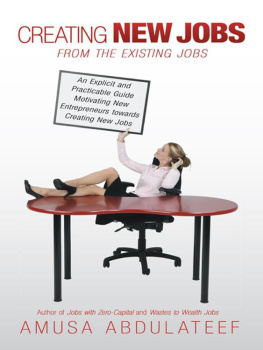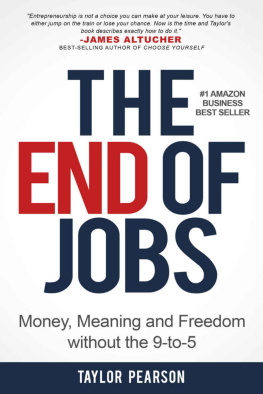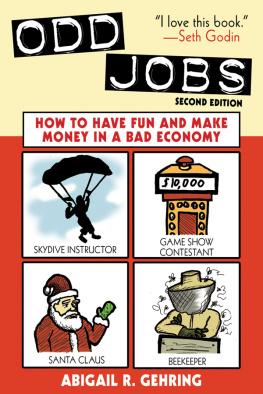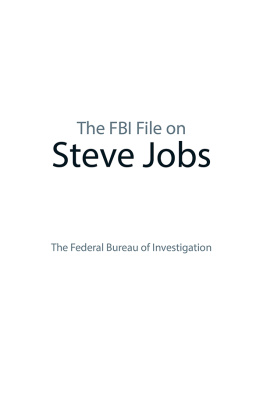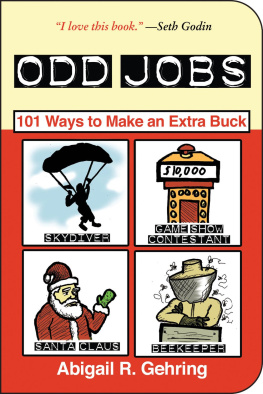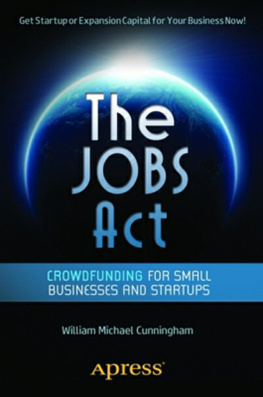Copyright 2011 by Steve Gillman. All rights reserved.
Published by John Wiley & Sons, Inc., Hoboken, New Jersey.
Published simultaneously in Canada.
No part of this publication may be reproduced, stored in a retrieval system, or transmitted in any form or by any means, electronic, mechanical, photocopying, recording, scanning, or otherwise, except as permitted under Section 107 or 108 of the 1976 United States Copyright Act, without either the prior written permission of the Publisher, or authorization through payment of the appropriate per-copy fee to the Copyright Clearance Center, Inc., 222 Rosewood Drive, Danvers, MA 01923, (978) 750-8400, fax (978) 646-8600, or on theWeb at www.copyright.com . Requests to the Publisher for permission should be addressed to the Permissions Department, JohnWiley & Sons, Inc., 111 River Street, Hoboken, NJ 07030, (201) 748-6011, fax (201) 748-6008, or online at www.wiley.com/go/permissions .
Limit of Liability/Disclaimer ofWarranty: While the publisher and author have used their best efforts in preparing this book, they make no representations or warranties with respect to the accuracy or completeness of the contents of this book and specifically disclaim any implied warranties of merchantability or fitness for a particular purpose. No warranty may be created or extended by sales representatives or written sales materials. The advice and strategies contained herein may not be suitable for your situation. You should consult with a professional where appropriate. Neither the publisher nor author shall be liable for any loss of profit or any other commercial damages, including but not limited to special, incidental, consequential, or other damages.
For general information on our other products and services or for technical support, please contact our Customer Care Department within the United States at (800) 762-2974, outside the United States at (317) 572-3993 or fax (317) 572-4002.
Wiley also publishes its books in a variety of electronic formats. Some content that appears in print may not be available in electronic books. For more information aboutWiley products, visit our web site at www.wiley.com .
Library of Congress Cataloging-in-Publication Data:
Gillman, Steve, 1964
101 weird ways to make money: cricket farming, repossessing cars, and other jobs with big upside and not much competition/Steve Gillman.
p. cm.
Includes index.
ISBN 978-1-118-01418-9 (paper)
ISBN 978-1-118-08574-5 (ebk)
ISBN 978-1-118-08572-1 (ebk)
ISBN 978-1-118-08571-4 (ebk)
1. Creative ability in business. 2. Success in business. I. Title.
HD53.G49 2011
331.702dc22
2011002030
Acknowledgments
I don't know what I would do without the loving support of Ana, the love of my life. Add to that the many hours she spent helping research the chapters here, and I owe her more thanks than I can offer on this page.
I also have to thank my editor, Richard Narramore, who pushed me to find real and accessible ways to make money that are still unusual or interesting so this would not be a book of untested ideas nor a routine employment guide. The book is better because of his suggestions.
Finally, thank you to all the individuals who participated in the interviews that appear in the book, as well as those who spent time helping me to understand the nature of the work involved in the jobs and businesses covered here.
Introduction
Some of the jobs, businesses, and investments covered here make millions for those who use them. Others are just profitable and interestingbetter than another day flipping burgers or negotiating office politics. And who knows? Every billion-dollar industry had to have its first millionaire, so you too might be the first to really hit it big with a new and fun way to make money.
Who would have guessed, even a year before it happened, that we would see the first millionaire investor in virtual real estate? Ailin Graef used her avatar to buy and sell imaginary land for real money in the online fantasy game called Second Life . Players want better fantasy homes and are willing to pay real dollars for them. Real-world corporations rent billboards that occupy strategic locations in online virtual worlds. Ailin started with just $9.95the monthly subscription feeand built a virtual real estate empire worth a million dollars.
And who would think that frightening geese could be profitable? David Marcks had a job as a grounds superintendent for a golf course and had to get rid of hundreds of geese. He had the idea to use dogs, and after experimenting with various breeds, he found that border collies could be trained to do the job without losing interest (as the other dogs did). From that start, he developed and grew his company, Geese Police, to the point where it generated millions in annual revenue.
Some jobs and businesses covered here are not so weird. In those cases I try to find a different approach. Providing day care is not unusual, for example, but a real need exists in some areas for day-care services that specialize in caring for children with developmental disabilities. Or consider power-washing. It has become common, but it's possible to specialize in washing garbage trucks or travel trailers. Normal ways to make money suddenly have less competitionand more income potentialonce you come at them from a new angle or find a new niche.
I have a good personal example of how a seemingly small niche can make money because of the lack of competition. Just prior to moving to Arizona, I bought lunch for my brother Chris and took notes as I questioned him about every aspect of carpet cleaning, a business he had been in for years. Once we settled in our new home in Tucson, I spent a few days putting together the web site www.HowToRemoveCarpetStains.com , which, as its name suggests, offers tips for removing stains from carpet.
From that point onward, I spent perhaps a few hours annually working on the site, eventually adding general carpet-care advice. Visitor traffic was slow to grow, but the site made about $30,000 profit in its first five years. I don't recall the last time I spent more than a few minutes working on it, but last month it made more than $1,500 (and it's just one of our many sites). Making web sites is old news, and everyone is doing it, but this shows the potential of a low-competition niche.
With that said, I have to also admit that not every nichein jobs or businessesis a good one. Some are likely to leave you struggling financially no matter how smart or motivated you are. Based on my experience, these tough niches include playing chess for money, picking fruit, and web sites about metaphors. That's okay though. I have enjoyed all three of these, and the pocket money they made for me was just a bonus (and my www.metaphorology.com makes enough money monthly to buy us dinner). It's great to build wealth, but you also have to enjoy what you do.
The moneymakers covered here have been carefully selected. Most are at least a bit weird or uncommon and therefore have less competition than most jobs or businesses. All of them are real ways that people have made money. I aimed for interesting, available in most areas, little money needed, little training needed, and potential for above-average income. Some entries meet all of these criteria, but all of the ways covered here meet at least several of them.
Money
You'll find a section with the above title in each chapter. The profit potential of some of the occupations covered here will be obvious, but some key ways to realize that potential will be pointed out. What about the less lucrative jobs and businesses? My advice is to use them for what they are: enjoyable ways to make some money, and steps toward bigger opportunities. For example, if you work as a bartender with the best shifts at the right clubs, you can have fun making a decent living, but if you want riches, you are free to use this as a means to someday own a chain of bars or nightclubs. And who knows where worm grunting, diaper cleaning, or mural painting might lead.




